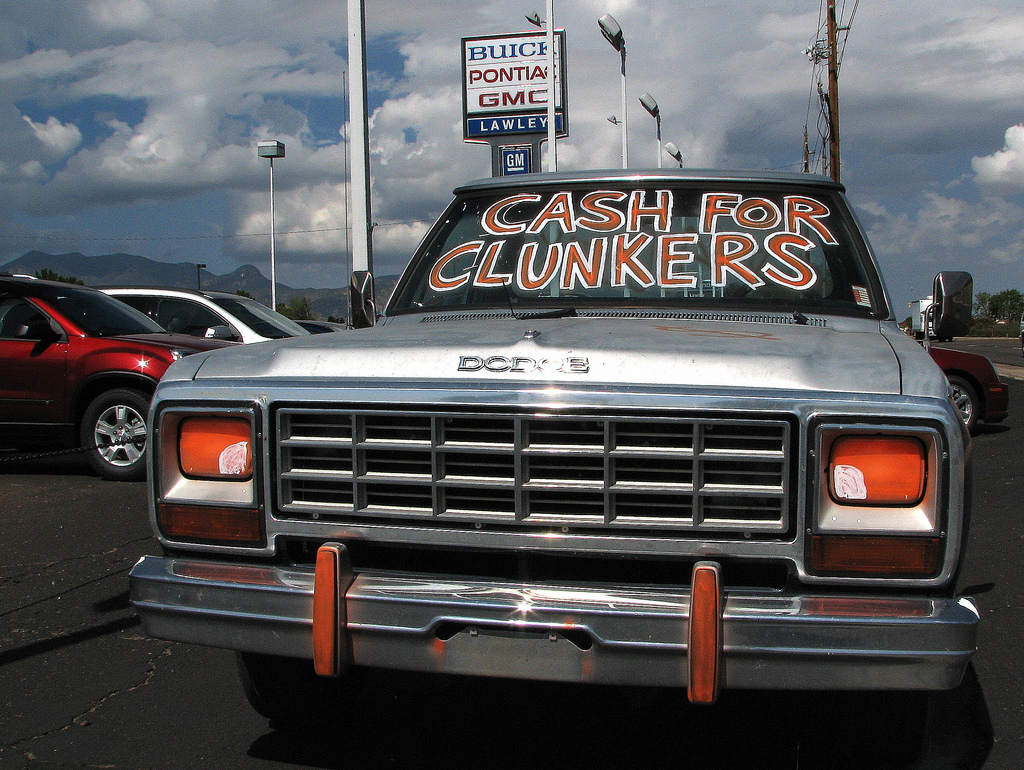feebates
-
Carbon tax in the U.K.: What does it mean for U.S. debate?
The U.K. may have just implemented a carbon tax. "Whuuut?" you're asking. Seriously. And it's kind of a funny story.
-
Like Cash for Clunkers? You’ll love feebates!
Photo: ThreatedThoughtsIt’s now fairly widely understood that Cash for Clunkers has worked great as a stimulus program but is negligible as an emissions-reduction program. That’s fine — it did what it was supposed to do. Now that we know how well people respond to cash incentives, though, it’s time to do some deeper thinking about […]
-
Some perspective on tax-and-dividend and a better alternative
James Hansen has again been lecturing Congress on the virtues of tax-and-dividend. I'm no policy expert, but neither is Dr. Hansen, so I'm going to share some of my own amateur observations for the benefit of fellow Grist wonks.
Hansen did some calculations and came up with the following dividend estimates for a $115/ton (equivalent to $1/gallon) tax:
Single share: $3000/year ($250 per month, deposited monthly in bank account)
Family with 2 children: $9000/year ($750 per month, deposited monthly in bank account)Wow! Free money! That sounds enticing. Of course, the money has to come from somewhere, so people's energy costs would, on average, increase by the same amount. But with that much money sloshing around there are bound to be huge inequities. For example, I live in northern California, where we have a mild climate and little coal power, and I don't need to drive much, so I might see my net income rise by maybe a couple thousand dollars. That would be nice, but folks back east who are paying more wouldn't like it one bit.
The tax rate and dividend should increase with time. ...
[The tax rate should increase until fossil fuel energy is not competitive with clean energy.]Nothing's going to happen until the tax rate is high enough to overcome the price barrier. Once it does, there will be a "tipping point" at which clean energy will start to overtake fossil fuels and a variety of positive feedback mechanisms (competition, technology, economies of scale, learning by doing) will make the transition self-sustaining and gradually less dependent on price supports. So what is needed is a high price incentive right away -- not a gradually escalating incentive.
However, a high price incentive does not imply a high tax; it is possible to have an initially high and declining carbon price incentive implemented through an initially low and increasing carbon tax.
-
A price signal in the vehicle market is best applied to the vehicle
Proponents of raising the gas tax -- and the chattering class is littered with them these days -- have a simple, central argument: gas taxes create a market signal that pushes all vehicle consumers in the direction of fuel efficiency.
Indeed, some conservatives (and car companies) go further: they say that CAFE standards are bad policy because they force automakers to create products for which there's no demand. It's no good making fuel-efficient cars if nobody wants to buy them! (Americans love big, powerful cars. "Everybody knows" that.) Higher gas taxes should replace CAFE, because they create create demand instead of forcing supply.
A moment's thought reveals a serious flaw in these arguments. Fuel costs are a relatively low portion of total vehicle costs -- maybe 10-20 percent. There's maintenance, insurance, parking, but most of all, the price of the car.
And when the time comes to buy a car, people don't behave like the rational interest maximizers of economic myth. They rarely calculate out future costs like fuel. They consider the number on the price tag in front of them: the price of the car.
It follows that if you want a market signal, you should put it where it will have the most effect: on the price of the car.
As it happens, we have a policy like that! Let's hand the mic to John Heywood, who has headed the Sloan Automotive Laboratory since 1972:
I think we need a purchase tax, a feebate system, like the French have instituted fairly recently. Fees for high-consuming vehicles and rebates for low-consuming vehicles. That will help reinforce consumer response to CAFE requirements by providing a market incentive.
There you go. A clear price signal, applied at the point of maximum effect, supplementing rather than replacing fuel efficiency standards. CAFE standards push automakers to make fuel-efficient cars; feebates push consumers to buy them. (Oh, and unlike gas taxes, feebates aren't regressive.)
How is this not a preferable policy, both economically and politically? What am I missing?

